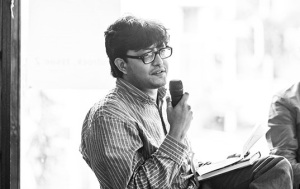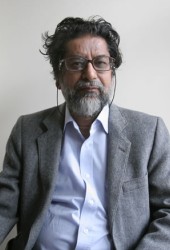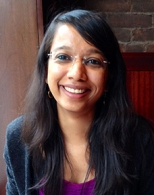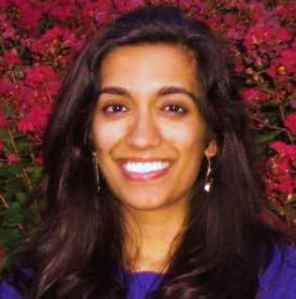Faculty Presenters
Jatin Dua – Faculty Panel: FRONTIER HISTORIES, BOUNDED KNOWLEDGES
Title: Encounters at Sea: The Borders of Piracy in the Western Indian Ocean
Jatin Dua is a socio-cultural anthropologist whose research focuses on maritime piracy in the Indian Ocean and projects and processes of governance, law, and economy along the East African coast. His current book project explores maritime piracy in the Western Indian Ocean within frameworks of protection, risk and regulation by moving between the worlds of coastal communities in northern Somalia, maritime insurance adjustors in London, and the global shipping industry.
Dua teaches courses on the anthropology of law and regulation; oceanic studies; global capitalism; state and non-state violence; and on the various historical and contemporary practices that have been labeled “piracy” from maritime raiding to the moral economy of hacking.
Bodhisattva Kar – Faculty Panel: FRONTIER HISTORIES, BOUNDED KNOWLEDGES

Title: Frontiers to Come: Landscape, Lineage and Limited Liabilities
Bodhisattva Kar received his PhD from Jawaharlal Nehru University, India, before joining the University of Cape Town in 2012. His research interests include histories of development and disciplines; primitivism; nineteenth and early twentieth-century history of South and South East Asia; connected and comparative histories of frontiers; nationalist formations; and joint–stock companies. Kar’s work tries to bring together economic and cultural histories into conversation, explore the anti-identitarian potential of the discipline, and develop an ethic of approaching the non-historical without giving up on the delights of the archive. Kar has co-edited New Cultural Histories of India: Materiality and Practices (Oxford University Press, 2013).
Sudipta Kaviraj – Faculty Panel: THE DEMOCRATIC LIFE OF VIOLENCE

Title: Democracy and Violence
Sudipta Kaviraj is a specialist in intellectual history and Indian politics. He works on two fields of intellectual history: Indian social and political thought in the nineteenth and twentieth centuries, and modern Indian literature and cultural production. His other fields of interest and research include the historical sociology of the Indian state, and some aspects of Western social theory. He received his PhD. from Jawaharlal Nehru University, New Delhi. Prior to joining Columbia University, he taught at the Department of Political Studies at the School of Oriental and African Studies, University of London. He has also taught Political Science at JNU, and was an Agatha Harrison Fellow at St. Antony’s College, Oxford. He is a member of the Subaltern Studies Collective.
Kaviraj’s books include The Imaginary Institution of India (2010) Civil Society: History and Possibilities co-edited with Sunil Khilnani (2001), Politics in India (edited) (1999), andThe Unhappy Consciousness: Bankimchandra Chattopadhyay and the Formation of Nationalist Discourse in India (1995).
Ajantha Subramanian – Faculty Panel: THE DEMOCRATIC LIFE OF VIOLENCE

Title: Meritocracy and Democracy: The Social Life of Caste in India
Ajantha Subramanian is an Assistant Professor in the Anthropology department at Harvard University. She offers courses on social movements, cultural and political rights, immigration, environmental politics, and leads an inter-disciplinary workshop in political ecology. Subramanian is the author of Shorelines: Space and Rights in South India (Stanford University Press, 2009), and is currently completing a book on resource rights struggles in southern India’s fishing economy. Her research interests grew out of political involvement in three different social movements: mobilization around slum dwellers’ rights to housing and other urban resources in Madras City; artisanal fisher activism against domestic and global capitalist restructuring of Indian fisheries; and opposition to Hindu majoritarianism in India and the Indian diaspora. She has held research and teaching positions at the Institute for Policy Studies, and at Cornell and Yale Universities.
Graduate Student Presenters
Alok Amatya – Graduate Student Panel on Violence
 Program: English PhD, University of Miami
Program: English PhD, University of Miami
Title: “Transnational Environmentalism from the Fourth World: Authenticity and Literary Form in Arundhati Roy’s Walking with Comrades.”
Alok Amatya is a doctorate student in English Literature at the University of Miami. His dissertation project studies resource conflict literature as a sub-canon within contemporary global literature. In 2013, he presented a paper at Florida International University’s Women and Gender Studies Conference on the divergence between local queer politics and transnational feminism in responses to Deepa Mehta’s 1996 film Fire. He also studies affect and sympathy in literary representations of Hurricane Katrina.
Dharitri Bhattacharjee – Graduate Student Panel on Sovereignty
 Program: Modern South Asian History PhD, University of Texas
Program: Modern South Asian History PhD, University of Texas
Title: Weak Border/Powerful Symbol: Engagement with historiography on Bengal’s borderlands.
Dharitri Bhattacharjee is working on her PhD in Modern South Asian History from the University of Texas. She has received her MA from Miami University, Ohio in Gender and Comparative World History as well as an MA in Modern Indian History from the University of Delhi. She has also presented the following papers:
- “To Decolonize or Not: Last Colonial Decade in Bengal (1937-1947)” Britain and the World Conference, British Scholar Society, Austin, Texas. April, 2015
- “De-centering the decolonization Debate: High Politics in Bengal” Annual Conference on South Asia at University of Wisconsin, Madison. October, 2014
- “Bureaucracy as a contested site of power in Bengal’s last colonial decade” Association for Asian Studies Annual Conference, San Diego, March 2013
- “Neglected Majority- Muslims in Bengal Historiography (1905-1947)” Annual Conference on South Asia at University of Wisconsin, Madison. October, 2008
Michael Collins – Graduate Student Panel on Citizenship
 Program: South Asia Studies PhD, University of Pennsylvania
Program: South Asia Studies PhD, University of Pennsylvania
Title: Recalling Democracy: An Ethnography of Democratic Participation
Michael Collins is a sixth year doctoral candidate in the Department of South Asia Studies at the University of Pennsylvania. Methodologically, his research takes cues from anthropology and political science to examine the democratic formation of the Viduthalai Chiruthaigal Katchi (Liberation Panthers Party), the largest Dalit political party in contemporary Tamil Nadu. In particular, his longitudinal study of democratic integration draws from conversations with Viduthalai Chiruthaigal leadership and cadre alongside ethnographic fieldwork supported largely by a Fulbright-Hays DDRA Award (September 2013 – May 2014). While much scholarship has examined the recent proliferation of political parties including lower caste assertion in modern India, Collins’ work incorporates the perspectives of party organizers alongside grassroots workers to examine ethnographically the gains, loses and compromises folded within formal democratic participation.
Sarah T. Hamid – Graduate Student Panel on Violence
 Program: Media Studies MA, University of Oregon
Program: Media Studies MA, University of Oregon
Title: Rape, Alterity, and the Politics of Speaking: Limitations of Occupying the Frame
Sarah T. Hamid is a MA candidate in Media Studies at the University of Oregon’s School of Journalism and Communication. She graduated from the University of the Pacific in 2010, majoring in English Literature and Post-Colonial Studies, and minoring in Film Studies, Art History, Gender Studies, and History. Currently, Sarah serves as Webmistress for the Fembot Collective – a collaboration amongst scholars, media producers, artists, and librarians promoting research on gender, new media and technology. Her research looks at developing a more nuanced understanding of new media technologies, “the” internet, infopolitics, and the lived and anticipated sociopolitical transformations being spurred on by the ubiquitous nature of digital (new/old) media.
Swaroopa Lahiri – Graduate Student Panel on Sovereignty
Program: International Affairs Program MA, Columbia University
Title: Precarious Borders: the Intricacies of the Indo-Bangladesh Frontier
Swaroopa Lahiri is studying for a Master’s in International Affairs at Columbia University’s School of International and Public Affairs (SIPA), with a concentration in Economic and Political Development and a regional specialization of South Asia. She completed her undergraduate degree from Sciences Po Paris’s Euro-American campus in Reims, France and spent her final year as an exchange student at the Massachusetts Institute of Technology where she worked as a research assistant at the Abdul Latif Jameel Poverty Action Lab’s (J-PAL) Agricultural Technology Adoption Initiative Department.
Autumn Mathias – Graduate Student Panel on Citizenship
Program: Sociology PhD, Northeastern University
Title: Responding to Violence in the “Homeland”: Identity and Transnational Activism within the Indian Christian Diaspora
Autumn is a PhD candidate in Sociology at Northeastern University.Prior to beginning at Northeastern, Autumn worked in diverse fields such as services to refugees and asylum seekers, foster care/adoption, elder services, and political advocacy/community organizing around issues impacting immigrants. Autumn’s research interests were inspired by her international travels and her experiences as a social worker, and she is a current licensed certified social worker (LCSW) in Massachusetts. She has completed comprehensive exams in ethnonationalist and religious conflict and violence and globalization and transnational processes. In particular, she has been studying transnational human rights activism spearheaded by diverse South Asian diasporas; her dissertation research is focused on the responses of Indian Christians in North America to communal violence in India. Currently, she is working with Dr. Liza Weinstein on a project examining the intersection between communal violence and demolitions of informal settlements in urban India vis a vis representations in Indian media.
Rijuta Mehta – Graduate Student Panel on Violence
 Program: Modern Culture and Media, Brown University
Program: Modern Culture and Media, Brown University
Title: The Repatriation Portrait: Women at the End of Empire
Rijuta Mehta is a PhD candidate in the department of Modern Culture and Media at Brown University. Her dissertation, titled The Anticolonial Snapshot: South Asian Disruptions, is an archival project that theorizes anticolonialism in South Asia through photographic and literary statements in the long twentieth century.
Natasha Raheja – Graduate Student Panel on Citizenship
 Program: Anthropology PhD, NYU
Program: Anthropology PhD, NYU
Title: From Minority to Majority: Pakistani Hindu Claims to Indian Citizenship
Natasha Raheja is a PhD Candidate in the Department of Anthropology at New York University, where she is also enrolled in the Culture and Media program. Her research interests are in the areas of citizenship, migration, and belonging along the India-Pakistan border. She will begin her dissertation fieldwork this fall.
Tariq L. Rahman – Graduate Student Panel on Sovereignty
 Program: International Studies (MA), University of Oregon
Program: International Studies (MA), University of Oregon
Title: Being Modern in Bhakkar City: A Gated Community in Rural Pakistan
Tariq L. Rahman is a Master’s candidate in the Department of International Studies at the University of Oregon. His research focuses on urban development in Pakistan and the role of the state, the military and private developers in that process. Tariq’s current project looks at the co-constitution of modern identities and a gated community in rural Pakistan. Tariq is a recipient of the University of Oregon’s Promising Scholar Award and his research has been supported by the Department of International Studies’ Slape Fellowship and Thurber Award. He has presented his work at Yale University’s Modern South Asia Workshop and the South Asian Literary Association’s (SALA) annual conference.










